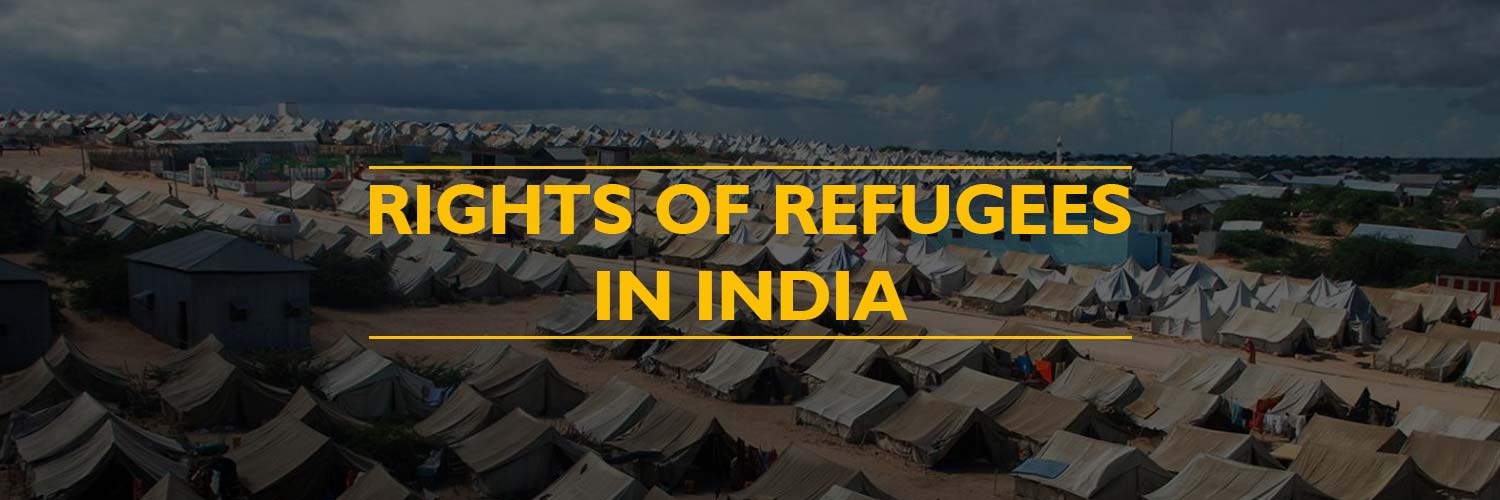Humanitarian Law and Refugee Rights in India
Humanitarian law, also known as international humanitarian law (IHL), encompasses a set of legal principles and norms aimed at mitigating the impact of armed conflict, protecting civilians, and upholding fundamental human rights, including the rights of refugees and displaced persons. In India, the legal framework for refugee rights is shaped by a combination of domestic legislation, international treaties, and judicial pronouncements, which seek to ensure the protection, assistance, and inclusion of refugees within the country’s legal and social fabric. In this blog, we will explore the legal landscape governing humanitarian law and refugee rights in India, analyze key legal provisions and challenges, and discuss strategies for promoting the rights and well-being of refugees in the country.
Refugee Rights in India
-
Legal Framework for Refugee Rights:
India does not have a specific domestic legislation governing refugee status or asylum procedures. However, the country is a party to several international conventions and protocols relating to refugee protection, including the 1951 Convention Relating to the Status of Refugees and its 1967 Protocol, which provide the legal foundation for refugee rights and obligations. Additionally, India is bound by customary international law principles, such as non-refoulement, non-discrimination, and the principle of non-penalization, which prohibit the expulsion or return of refugees to countries where they may face persecution or serious harm.
-
Challenges in Refugee Protection:
Despite its international commitments, India faces several challenges in providing effective protection to refugees and asylum seekers within its territory. The absence of a comprehensive legal framework for refugee status determination and asylum procedures often results in ad hoc and inconsistent approaches to refugee protection, leading to gaps in legal recognition, access to rights, and entitlements for refugees. Additionally, refugees and asylum seekers are vulnerable to detention, deportation, and harassment by law enforcement authorities, exacerbating their marginalization and insecurity.
-
Role of the Judiciary in Refugee Rights:
The Indian judiciary has played a significant role in upholding refugee rights and ensuring compliance with international legal norms. Landmark judgments such as National Human Rights Commission v. State of Arunachal Pradesh (1996) and Louis De Raedt v. Union of India (1991) have reaffirmed the constitutional guarantee of equality and non-discrimination, extending protection to refugees and asylum seekers and recognizing their entitlement to fundamental rights and humanitarian assistance. The judiciary has also intervened in cases of arbitrary detention, refoulement, and human rights violations against refugees, emphasizing the need for procedural safeguards, judicial review, and adherence to international legal standards in refugee protection.
-
Access to Services and Livelihood Opportunities:
Refugees and asylum seekers in India face significant barriers in accessing essential services, including healthcare, education, and employment, due to legal and administrative restrictions, socio-economic marginalization, and social stigma. The lack of formal recognition and documentation often restricts refugees’ mobility, restricts their access to public services, and limits their ability to integrate and contribute to the host community. Providing refugees with legal status, documentation, and access to livelihood opportunities is essential to promoting their self-reliance, dignity, and socio-economic inclusion.
-
Refugee Protection in the Context of Forced Migration:
India is home to a diverse population of refugees and displaced persons, including Rohingya refugees from Myanmar, Tibetan refugees, Sri Lankan Tamils, and Afghan refugees, among others. The protracted nature of displacement, coupled with political instability, conflict, and persecution in neighboring countries, underscores the importance of comprehensive and rights-based approaches to refugee protection and humanitarian assistance. Collaborative efforts between the government, civil society organizations, and international humanitarian agencies are essential to addressing the complex needs of refugees, providing humanitarian aid, and facilitating durable solutions, including voluntary repatriation, local integration, and resettlement.
-
Strengthening Refugee Protection Mechanisms:
Addressing the challenges of refugee protection in India requires concerted efforts to strengthen legal frameworks, enhance institutional capacity, and foster partnerships between government agencies, civil society organizations, and the international community. Developing a national refugee law, establishing asylum procedures, and ratifying the 1951 Refugee Convention and its 1967 Protocol would provide a comprehensive legal framework for refugee protection and asylum governance in India. Additionally, investing in refugee assistance programs, legal aid services, and psychosocial support initiatives can enhance the resilience and well-being of refugees and contribute to their successful integration and self-reliance.
Engage with Dhiti Law Firm:
Upholding humanitarian law and protecting refugee rights are integral to India’s commitment to promoting human dignity, justice, and solidarity with the most vulnerable populations. As a leading law firm dedicated to advancing human rights and social justice, Dhiti Law Firm recognizes the importance of legal advocacy, policy reform, and collective action in ensuring the protection, inclusion, and empowerment of refugees and displaced persons in India. Contact us today to learn more about our expertise in refugee law and how we can support your efforts to promote refugee rights and humanitarian assistance in India and beyond.


